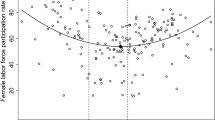Abstract
In this paper, we show how we came to explore Beck’s theory of individualization in the light of a qualitative study of livelihood strategies in post-2008 Spain and Cyprus. We observed that experiences of downward social mobility in contexts of welfare retreat and precarious labor conditions were compelling people to build marketed individualities and to create individual biographies with recourse to a highly individualized rhetoric. However, analysis of a very diverse sample of subjects from different socio-economic backgrounds showed us that individualization theory must be conceptualized within a framework of social structures, and that Beck’s individualization theory fails to recognize its persistence in contemporary societies. We therefore propose looking at individualization as a contemporary process through which class differences are expressed. Only in this way can it serve as a useful theoretical tool with which to understand the workings of contemporary capitalism and the ways in which new values and moral frameworks are being formed.

Similar content being viewed by others
Notes
See, for example, Bernardi (2007)’s compelling critique, in Le Quattro Sociologie e la Stratificazione Sociale, where he clearly describes the main contradictions and gaps in the theory. For example, like other scholars, he calls into question the assertion that inequality is becoming generalized among all social classes, but also pointed towards the difficulties inherent in the coexistence of the thesis on the individualization of poverty and that on the increase of inequality.
References
Armano, E., and A. Murgia. 2017. Hybrid Areas of Work in Italy: Hypothesis to Interpret the Transformations of Precariousness and Subjectivity. In Mapping Precariousness, Labour Insecurity and Uncertain Livelihoods, ed. E. Armano, A. Bove, and A. Murgia. London: Routledge.
Atkinson, W. 2010. The Myth of the Reflexive Worker: Class and Work Histories in Neo-liberal Times. Work, Employment and Society. 24 (3): 413–429.
Bauman, Z. 2001. The Individualized Society. Cambrige. Polity Press.
Beck, U. 1992. Risk Society: Towards a New Modernity. London: Sage.
Beck, U. 1996. The Reinvention of Politics.Rethinking Modernity in the Global Social Order. Cambridge: Polity Press.
Beck, U., and E. Beck-Gernsheim. 2002. Individualization: Institutionalized Individualism and its Social and Political Consequences. London: Sage Publications.
Beck, U., Giddens, A. and Lash, S. 1994. Reflexive Modernization.Politics, Tradition and Aesthetics in the Modern Social Order. Cambridge: Polity Press
Beck, U., W. Bonss, and C. Lau. 2003. The Theory of Reflexive Modernization. Theory. Culture & Society. 20 (2): 1–33.
Bernardi, F. 2007. Le Quattro Sociologie e la Stratificazione Sociale. Sociologica .
Brannen, J., and A. Nilsen. 2005. Individualisation, Choice and Structure: a Discussion of Current Trends in Sociological nalysis. The Sociological Review 53 (3): 412–428.
Cetina, K. 1997. Sociality with Objects: Social Relations in Post social Knowledge Societies. Theory. Culture & Society 14 (4): 1–30.
Arndt, C., and Hörisch, F. 2015. Flexicurity Policies in Europe: Diffusion and Effects of flexicurity labour market policies. Working Paper. CUPESSE (2). http://cupesse.eu/fileadmin/cupesse/downloads/working-papers/CUPESSE_Working-Paper_2.pdf.
Dardot, P., and C. Laval. 2009. La Nouvelle Raison du Monde. Essai sur la Societé Neóliberale. Paris: La Découverte.
Denning, M. 2010. Wageless Life. New Left Review 60 (November–December). https://newleftreview.org/II/66/michael-denning-wageless-life.
Festinger, L. 1957. A theory of cognitive dissonance. Stanford: Stanford University Press.
Foucault, M. 2008. The Birth of Biopolitics: Lectures at the Collège de France, 1978–1979. NY: Palgrave Macmillan.
Freeman, C. 2014. Entrepreneurial Selves: Neoliberal Respectability and the Making of a Caribbean Middle Class. Durham : Duke University Press.
Frykman, J., and O. Löfgren. 1987. Culture Builders: A Historical Anthropology of Middle-Class Life. London: Rutgers University Press.
Fumagalli, A. 2010. Bioeconomía y Capitalismo Cognitivo. Hacia un Nuevo Paradigma de Acumulación. Navarra: Traficantes de Sueños.
Giddens, A. 1991. Modernity and Self-Identity. Self and Society in the Late Modern Age. Cambridge : Polity.
Graeber, D. 2013. It is Value that Brings Universities into Being. Journal of Ethnographic Theory 3 (2): 219–243.
Hochschild, Arlie R. (ed). (1983). The Managed Heart: Commercialization of Human Feeling. Berkeley, CA: University of California Press.
Kashmir, S., and A. Carbonella. 2014. Blood and Fire: Toward a Global Anthropology of Labour. Oxford: Berghahn Books.
Kjaerulff, Jens. (2015). Flexible Capitalism: Exchange and Ambiguity at Work. United Kingdom: Berghahn Books.
Lazzarato, M. 2012. The Making of The Indebted Man: An Essay on the Neoliberal Condition. Los Angeles: Semiotext(e).
Millar, K. 2014. The pPrecarious Present: Wageless Labour and Disrupted Life in Rio de Janeiro. Brazil. Cultural Anthropology 21 (1): 32–53.
Mingione, E. 1991. Las Sociedades Fragmentadas: Una Sociología de la Vida Económica más allá del Paradigma del Mercado. Madrid: Ministerio de Trabajo y Seguridad Social.
Molé, N.J. 2012. Hauntings of Solidarity in Post-Fordist Italy. Anthropological Quarterly 85 (2): 371–396.
Muehlebach, A. (2012). The Moral Neoliberal: Welfare and Citizenship in Italy. Chigaco: The University of Chicago Press.
Muehlebach, A., and N. Shoshan. 2012. Introduction. Post-Fordist Affect. Anthropological Quarterly 85 (2): 317–343.
Narotzky, S., and N. Besnier. 2014. Crisis, Value and Hope: Rethinking the Economy. Current Anthropology 55 (9): S4–S16.
Offer, S. 2012. The Burden of Reciprocity: Processes of exclusion and withdrawal from personal networks among low-income families. Current Sociology 60 (6): 788–805.
Putnam, R. 2000. Bowling Alone: The Collapse and Revival of American Community. New York: Simon and Schuster.
Rose, N. 1999. Governing the Soul: The Shaping of the Private Self London: Free Association Books.
Skeggs, B. 2004. Class, Self, Culture. London: Routledge.
Valenzuela, H., L. Reygadas, and F. Cruces. 2015. Mi trabajo es mi vida. La incrustación de los mundos de la vida y del trabajo en empresas españolas. / My job is my life. Overlap between life and work in Spanish companies. Revista Española de Investigaciones Sociológicas 150: 191–210.
Vogt, K. C, 2017. The Concept of the Work Situation in Class Analysis. Current Sociology. Pp.1–18.
Acknowledgements
The article’s main author, Marta M. Lobato, would like to thank anonymous reviewers, especially reviewer number one, for their valuable comments and suggestions.
Author information
Authors and Affiliations
Corresponding author
Rights and permissions
About this article
Cite this article
Lobato, M.M., Molina, J.L. & Valenzuela-García, H. Individualization, inequality, and labor: a qualitative approach. Dialect Anthropol 42, 277–291 (2018). https://doi.org/10.1007/s10624-018-9512-y
Published:
Issue Date:
DOI: https://doi.org/10.1007/s10624-018-9512-y




